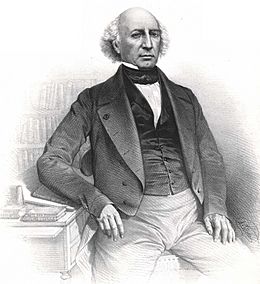Mathieu Orfila facts for kids
Quick facts for kids
Mathieu Orfila
|
|
|---|---|

Mathieu Joseph Bonaventure Orfila
|
|
| Born | 24 April 1787 |
| Died | 12 March 1853 (aged 65) |
| Nationality | Spanish |
| Citizenship | Spanish |
| Alma mater | University of Valencia University of Barcelona |
| Known for | Founded toxicology |
| Scientific career | |
| Fields | Toxicology and chemistry |
| Influences | Louis Nicolas Vauquelin |
Mathieu Joseph Bonaventure Orfila (Catalan: Mateu Josep Bonaventura Orfila i Rotger) was a very important Spanish scientist. He lived from 1787 to 1853. He is known as the founder of the science of toxicology.
Toxicology is the study of poisons. It looks at how poisons affect living things. Orfila was also a skilled chemist. His work helped make the study of poisons a real science.
Contents
Who Was Mathieu Orfila?
Mathieu Orfila was born on April 24, 1787. His birthplace was Mahón, a town on the island of Menorca. Menorca is part of Spain. He later moved to France.
He became a well-known doctor and professor. He taught at important universities in Paris. He was a Spanish citizen. He spent most of his adult life working in France.
Early Life and Education
Orfila showed a talent for science from a young age. He first studied medicine in Spain. He went to the University of Valencia. Then he studied at the University of Barcelona.
Later, he moved to Paris, France. There, he focused on chemistry. He learned from some of the best chemists of his time. This strong science background helped him greatly.
Founding Toxicology
Before Orfila, people knew about poisons. But there was no organized way to study them. Orfila changed this. He created the first scientific methods. These methods helped find poisons in the body.
He wrote a very important book. It was called "Treatise on Poisons." This book was published in 1814. It became the main textbook for toxicology. It taught doctors and scientists how to identify poisons.
How Orfila Helped Justice
Orfila's work was very important for solving crimes. If someone was poisoned, his methods could help. Doctors could use his tests to find the poison. This helped police and courts.
He often testified in court cases. He explained his scientific findings. This helped judges and juries understand if a person had been poisoned. He made toxicology a key part of forensic science. Forensic science uses science to solve crimes.
Contributions to Chemistry
Besides toxicology, Orfila also did a lot in chemistry. He studied many different chemicals. He looked at how they reacted. His work in chemistry supported his toxicology research.
He helped improve how chemicals were analyzed. This made it easier to detect tiny amounts of poisons. His research made science more accurate.
Legacy and Impact
Mathieu Orfila died on March 12, 1853. He was 65 years old. His work left a lasting mark. He is remembered as the "father of toxicology."
His scientific approach is still used today. Modern toxicology builds on his early ideas. He helped make the world safer. He also helped make the justice system fairer.
See also
 In Spanish: Mateo Orfila para niños
In Spanish: Mateo Orfila para niños

